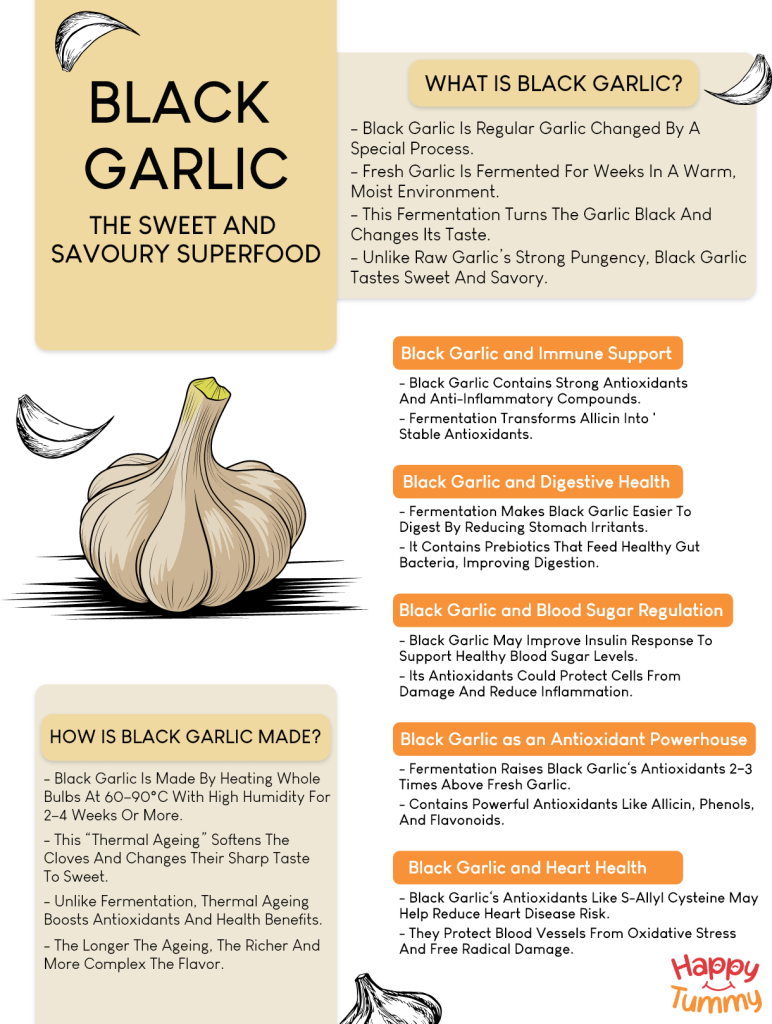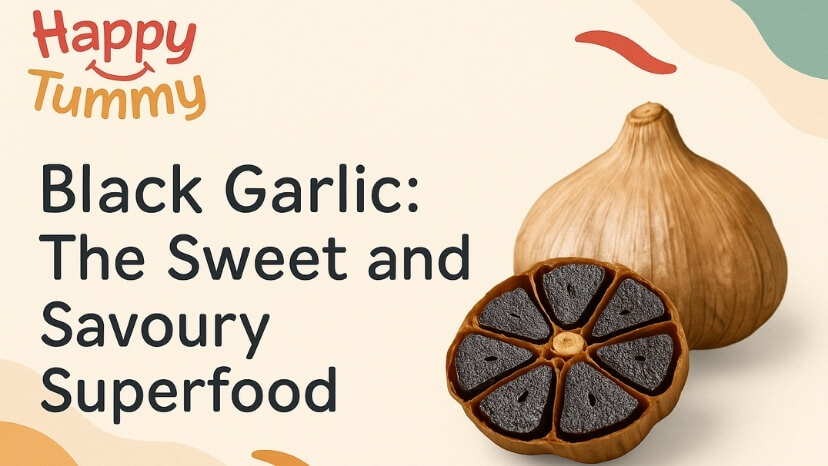Table of Contents
Garlic has a rich history of pride in its bold taste and astounding health benefits, but black garlic takes this ordinary spice to a new level. Fresh garlic cloves are aged to make black garlic until they become tender, dark, and sweet, tasting like caramel, molasses, and umami.
This transformation not only tames the pungency of raw garlic but also enhances its nutritional value. Black garlic is fast-growing in the list of superfoods. Chefs and health enthusiasts love black garlic as it contains many antioxidants and might support immunity and heart health.
Due to its flexibility, black garlic stands out in varied meals, from gourmet sauces and marinades to ordinary spreads and salads. Its strange sweetness and savouriness make it a scrumptious health food. Whether you love trying new foods or want to stay healthy, black garlic is good for your body.
Read on to discover why this centuries-old add-on is charming today’s palates while managing health risks with each delicious clove.
What Is Black Garlic?
Black garlic is not a special form of garlic. It is a typical garlic that has been altered by a peculiar procedure. If fresh garlic is left for weeks to be fermented in a warm and moist environment, it turns black and tastes different.
Instead of the pungent taste of raw garlic, black garlic becomes sweet and savoury with hints of molasses, balsamic vinegar, and even a bit of tasty tamarind.
The cloves also wind up soft and chewy like dried fruit. These unique flavours and textures make black garlic a common ingredient in cooking and healthy foods.

Health Benefits of Black Garlic
It’s time to rediscover the powerful benefits of black garlic for your health.
#1 Black Garlic and Immune Support
Black garlic may support the immune system due to its high levels of antioxidants and anti-inflammatory properties. Allicin breaks down during the process, forming more stable compounds like S-allyl cysteine, which may enhance antioxidant capacity [1] .
Additionally, fermentation can create prebiotics, promoting the growth of gut-healthy bacteria. A healthy microbiota in the gut usually implies better immune health.
Research reveals that black garlic stimulates the production of cells vital in resisting sickness.[2] While research continues, these features may suggest that black garlic might be a helpful supplement for general immunity.
#2 Black Garlic and Digestive Health
Digesting black garlic could be simpler, since fermentation takes out or alters some substances that may upset your stomach. This step ensures that it is easier for many people to digest.[3]
Also, black garlic could help improve the gut bacteria ratio with prebiotic components that feed on healthy bacteria that assist digestion. A good balance of bacteria supports the body in absorbing nutrients properly. Consuming black garlic by itself won’t solve the problem of bloating and gas, but it could help your body manage these issues better.
Thus, black garlic may make bowel movements easier and more regular. However, additional studies are needed to better understand its impact and ensure these possible benefits. [4]
#3 Black Garlic and Blood Sugar Regulation
Black garlic may maintain a healthy blood sugar level by normalising the body’s response to insulin. Because black garlic may promote healthy insulin levels, it may help manage changes in blood sugar that might affect energy and general well-being. [5]
Black garlic also contains many antioxidants, which may protect cells from damage caused by high blood sugar and minimise inflammation.
We need to have more studies on these potential effects, yet black garlic is interesting for people contemplating healthy blood sugar management.[6]
#4 Black Garlic as an Antioxidant Powerhouse
Black garlic is usually called an antioxidant powerhouse due to the fermentation process, which increases its antioxidant content much higher than that of fresh garlic. During fermentation, certain active ingredients in garlic are converted to more stable and active antioxidants in the form of allicin, a compound responsible for a two—to three—fold increase in antioxidants in fermented garlic.
Important antioxidants present in black garlic include phenols, flavonoids, Allyl Cysteine, and S-allylmercaptocysteine.[7] These antioxidants may assist in counteracting free radicals, or unstable molecules that can damage cells and lead to various health problems, such as ageing and heart issues.
Black garlic’s ability to manage oxidative stress may help maintain general health and protect the body from various chronic diseases.
#5 Black Garlic and Heart Health
Black garlic contains S-allyl cysteine and polyphenols, and experts are studying these compounds for their helpful role in lowering heart disease risks related to oxidative stress. Oxidative stress may harm your blood vessels and immune system, making you prone to heart and vascular issues.[8]
Black garlic’s antioxidants may help your heart by managing the damaging effects of free radicals. Since additional research is being done, eating black garlic and similar foods is an easy way to support your heart health naturally.
How Is Black Garlic Made?
Black garlic is produced by exposing whole bulbs to a warm and humid environment ranging from 60°C to 90°Cwithh a high humidity environment for two to four weeks or more. This heating process causes chemical changes in the garlic cloves, making them soft and giving them a sweet taste after a sharp one.
Unlike fermentation, black garlic is based on “thermal ageing,” which enhances its antioxidant status and health properties: the more the garlic ages, the richer and more complex the taste.
How to Make Black Garlic at Home
Making black garlic at home with a few things involved and patience is easy. The process involves slowly ageing whole garlic bulbs at controlled warmth and humidity, which modifies the flavour and texture of the bulbs.
What You Will Need:
- Whole garlic bulbs (keep them unpeeled)
- A slow cooker with a “warm” setting
- Aluminum foil
Step-by-Step Instructions:
- Leave the garlic bulbs whole and unpeeled. To prevent them from drying, wrap each bulb in pieces of aluminium foil.
- Insert the garlic bulbs into the slow cooker and turn it to “warm.” This will lower the temperature enough to accommodate the ageing process.
- Leave the garlic bulbs in the slow cooker for two weeks to age. Do not open the cooker, which will provide uniform temperature and humidity.
- After two weeks, open one bulb to check it. The cloves should have become black and soft and have developed a sweet, savoury scent. If not quite ready, reroll and keep ageing, checking every few days.
Tips:
- The process can lead to a strong smell, so it is best to keep the slow cooker in a well-ventilated place, such as a garage, to prevent strong odours.
- Ensure the slow cooker stays on “warm” but does not turn to a higher temperature, which could cook the garlic instead of aging it.
- Proper preparation is necessary to avoid botulism. Reduce this hazard by cleaning up, ventilating well, and following good hygiene while you apply the chemicals. You should not use homemade methods for treatment or commercially without the help of a trained expert, since they can be dangerous.
With these steps, you can make your black garlic. Black garlic is a diverse, nutritious ingredient that can improve the taste of different dishes.
The Bottom Line
Black garlic provides a combination of flavours and potential health benefits that could help with well-being, such as immunity, digestion, blood sugar regulation, antioxidant protection, and anti-heart disease.
Although it is a great addition to a balanced lifestyle, it is important to remember that no food can promise health on its own. A balanced diet of various nutrients is critical for overall health and well-being. Eating a mix of different whole foods guarantees your body the vitamins, minerals, and energy it needs to operate at its best.
You can contact our healthcare professional to learn how to incorporate black garlic into your daily life and whether it is safe.
Frequently Asked Questions
Black garlic has a sweet and savoury taste, molasses and balsamic vinegar notes, and a mild umami flavour. It is much less pungent than raw garlic but is soft and chewy in texture.
Black garlic is formed for weeks by fermenting whole bulbs in warm, damp conditions. This process alters its colour, taste, and even chemical composition, and humans enjoy a sweeter, milder-tasting drink with a higher concentration of antioxidants.
Yes! Black garlic is appropriate for various meals—smeared on toast, added to sauces, salad dressings, soups, or marinades. Its distinct flavour enhances without the rawness of garlic.
However, most people find black garlic safe for consumption at regular intervals when served on a balanced diet. However, if you have certain health conditions or take some medications, you may need to consult your healthcare provider before using it as part of your routine.
Keep black garlic in an airtight container in a dry and cool place. It can also be refrigerated for long periods to preserve its shelf life and freshness for months. If you see signs of mold or fungus on the garlic, dispose of it right away to prevent health problems.















